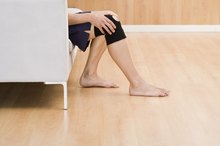Can Running Pull Rib Muscles?
Your rib cage is supported by a network of tendons and muscles that allow for the expansion and contraction of your lungs and torso movement. Running can strain muscles around the torso, particularly if your muscles are cold or you push beyond your endurance. Muscle pulls can also occur after running; tired muscles are more easily injured by a sudden movement or impact. Location of rib muscles makes treatment difficult. Talk to your doctor about your pain and possible treatment options.
Muscles Around the Ribs
The ribs have their own set of muscles called intercostals that occupy the spaces between each rib. The internal intercostals lie deep between the ribs and run down and back toward the spine. Separated by a layer of fibrous tissue called fascia, the external intercostals are closer to the skin; these muscles run down and forward. Your transversus thoracis also attaches to your ribs, as do the serratus anterior and posterior muscles, the levatores costarum and the subcostals. All of these muscles provide support to the rib cage and work in expansion, contraction, lowering and lifting the ribs during the breath cycle.
- The ribs have their own set of muscles called intercostals that occupy the spaces between each rib.
- Separated by a layer of fibrous tissue called fascia, the external intercostals are closer to the skin; these muscles run down and forward.
Muscle Strains and Running
Flank Pain From a Stretching Tear or Pulled Muscle
Learn More
A pulled muscle or strain occurs when muscle fibers are stretched or torn during activity or impact. Strains come in two varieties: acute and chronic. Abruptly pulling or tearing a muscle beyond its range of motion causes acute strains. A sudden twist, turn or sprint during a run can strain the muscles surrounding your rib cage. Sharp pain or muscle spasms indicate an acute strain. Chronic strains occur gradually; prolonged, repetitive movement of a muscle group may eventually lead to muscle fiber tears. Long-distance or long-term recreational runners are more at risk for chronic strains. Pain, like the injury, may manifest gradually, limiting movement and decreasing performance over time.
- A pulled muscle or strain occurs when muscle fibers are stretched or torn during activity or impact.
- Chronic strains occur gradually; prolonged, repetitive movement of a muscle group may eventually lead to muscle fiber tears.
Post-Run Injury
Fatigue leaves muscles vulnerable to injury. Tired rib muscles can easily stretch or tear if not given adequate time to rest. Raking, gardening or even picking up your child soon after a long run can pull a muscle in your torso. Injury can even happen the day after a run, particularly if you pushed your endurance limit. Stretching can help prevent muscle strains. Yoga's side stretch pose helps lengthen rib cage, chest and shoulder muscles. Stand with your feet flat on the ground, raise your left arm up and lean toward the right until you feel a stretch in your side. Hold for 30 seconds and switch sides.
- Fatigue leaves muscles vulnerable to injury.
- Tired rib muscles can easily stretch or tear if not given adequate time to rest.
Treatment
Torn Tendons & Ligaments From Hyperextension
Learn More
Mild strains heal on their own with adequate rest. You can use icepacks on the injured area to reduce swelling and pain. Over-the-counter anti-inflammatory medications are also helpful. Breathing may be difficult with rib muscle strain and mobility is affected. If you experience breathlessness, cannot walk more than four steps without significant pain or see red streaks spreading out from your injury, contact your doctor immediately.
- Mild strains heal on their own with adequate rest.
- You can use icepacks on the injured area to reduce swelling and pain.
Related Articles
References
- Human Anatomy: Muscles of the Thorax
- Yoga Learning Center: Standing Side-Stretch Pose
- Barclay T. Intercostal muscles. Innerbody. Updated October 27, 2017.
- Donley ER, Loyd JW. Anatomy, thorax, wall movements. StatPearls Publishing. Updated February 10, 2019.
- Tran H. Upper back pain from intercostal muscle strain. Spine-Health. Updated October 20, 2017.
- Yoo WG. Effect of a combined thoracic and backward lifting exercise on the thoracic kyphosis angle and intercostal muscle pain. J Phys Ther Sci. 2017;29(8):1481–1482. doi:10.1589/jpts.29.1481
Writer Bio
Christy Callahan has been researching and writing in the integrative health care field for over five years, focusing on neuro-endocrinology. She has a Bachelor of Science degree in biology, earned credits toward a licensure in traditional Chinese medicine and is a certified Pilates and sport yoga instructor.









